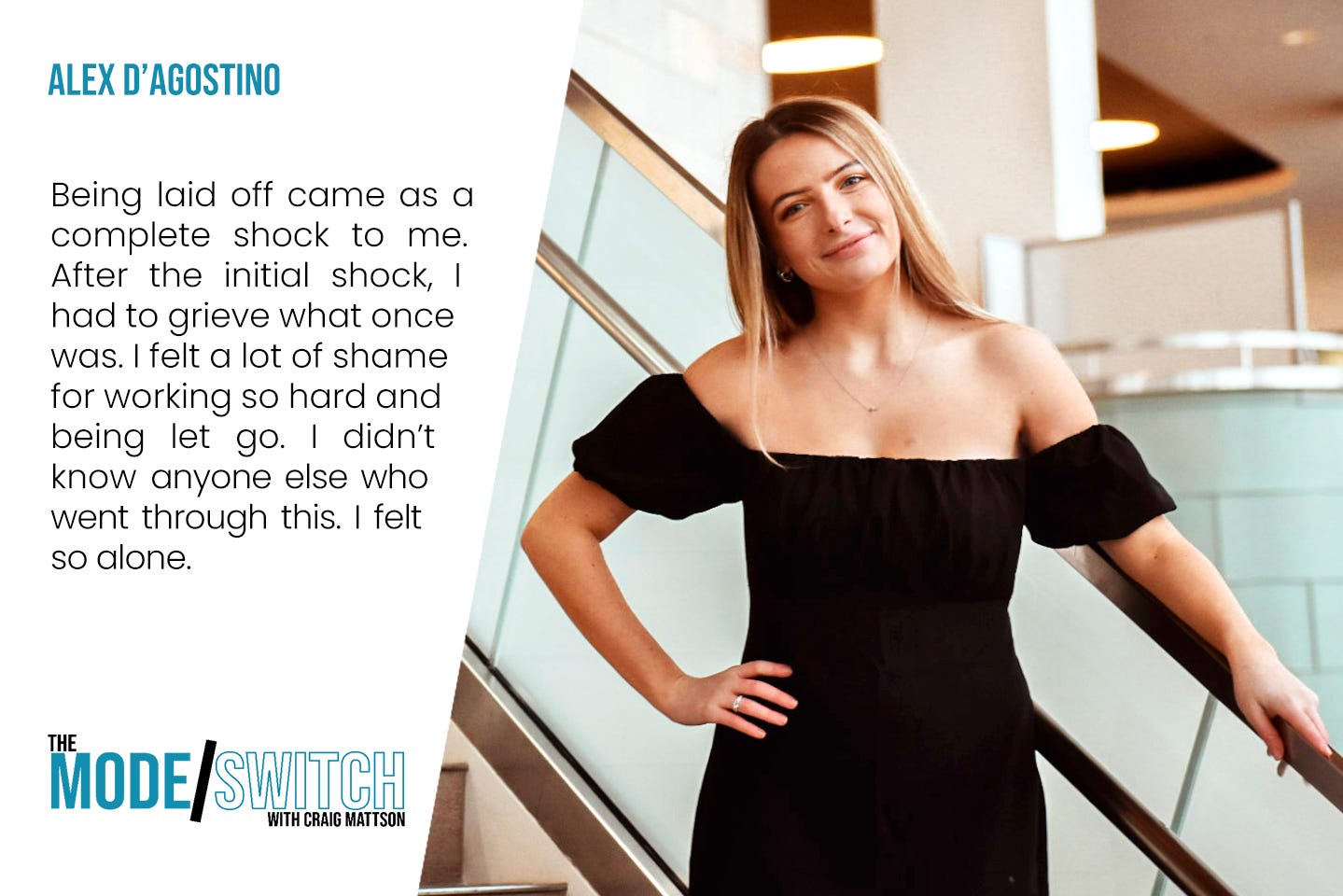In this week’s issue, Craig thinks he’s found inspirational job stories from rising professionals and finds instead some stories about getting fired—which prove weirdly inspiring.
Dismissed. Discharged. Axed. Ousted. Pink-slipped. Shanked. Shown the door. We don’t need more words for getting fired, but we do need more stories to live by when it happens. Here are two.
Story Number One: Kelsey Brooks has a narrative about betrayal and loss that we need to hear—but I have to confess that I didn’t see it coming as we started our interview. As Assistant Director of Recruitment & College Relations at the off-campus semester Chicago Semester, she’s a veteran and artful communicator. I’ve admired her pitches and her presentations to my own undergraduates, and this interview had a similarly generous and hopeful vibe. She’s clearly good at what she does, and she clearly does what she loves.
So, let’s just say, I had a hard time anticipating where her story took me then.
She began her tale in a vibrant and nurturing home strengthened by a supportive faith community. Religious faith, she was quick to say, has always been integral to her identity. But the year she went to college, her parents filed for divorce, and her troubles began in earnest.
Being an Enneagram 2 in a divided family meant she needed to establish personal boundaries. As a helper for everyone else, it was time she learned to help herself. Good thing she was already a skilled user of language. Why not become a communication major? Good thing she was smart and industrious. Why not do a double major? Good thing she wanted to be a dolphin trainer—no, wait, that was her childhood dream. But she’d become more practical, thanks to a lot of sages in her life telling that studying Spanish would make it very easy to get a job after college.
Which it did, sort of. But it wasn’t what her advisors said as what they didn’t say that gave Kelsey the most trouble. “No one in college’s like, ‘You're gonna get fired one day.’ You know what I mean? And your parents don't talk to you about that either. When it comes up, you have to figure it out.”
On her own after college, she found two jobs, one at Starbucks, one as a bilingual receptionist. “My days would be really long—5 to 11 at Starbucks and then 2 to 7 at the Community Center. I got to use my Spanish, which was great, but that time frame is not sustainable.” She added, “It took me a long time to get a full-time job.”
But that job proved to be, as she put it, “super niche”—a small company manufacturing rubber products—and unsustainable. A year and a half later, she transitioned to another niche company, serving as an export logistics coordinator. This time, her Spanish-speaking skills were much in demand, as she found herself working with people in Guatemala, trying to figure out how to ship 40,000 pounds of chicken overseas. But not even her fluency prepared her for the obscure terminology of logistics and fulfillment services. Things took longer that her supervisor wanted, sometimes forcing Kelsey to work 50-60-hour weeks.
The HR Department called her in. At the meeting, her supervisor told the HR manager that, because Kelsey wasn’t doing her job well, she (the supervisor) felt overwhelmed. Kelsey’s a helper, remember? So, it was tough to hear that her supervisor didn’t find her helpful. That, she told me, felt like “a dagger to the heart.” Kelsey felt exhausted and gaslighted and deeply sad.
A few weeks later, the company fired her.
We don’t need more words for getting fired, but we do need more stories to live by when it happens.
Kelsey told me it was the first time that she had experienced a rejection in isolation. Her parents and her former professors suddenly seemed a little naive. None of her friends could comprehend what was going on. They weren’t having trouble keeping their jobs. Why was she? Even God seemed busy with other things. “You open up this door for me,” she found herself praying. “Why would you slam it in my face so hard?”
Kelsey could easily have skipped that part of her story. She could so easily have resorted to a narrative like, “Here’s How I Made My Life Awesome”—and I would never have known anything different. But I’m glad she took the risk to tell a struggle-betrayal-loss story, because doing so made me recognize a mode switch in the making.
Story Number Two: Just a few weeks before this interview, a grad student of mine, Alex D’Agostino, had texted to say she’d lost her job as a content creator for a dental agency. When that text pinged on my phone, I’d thought one thing: “How can Alex’s support network get her back to work?” Scatter the emails, shoot off the texts, drop-kick the queries, fire off the recommendations.
But something about Kelsey’s story made me switch modes from Sending to Hearing. (If you’re into comm theory, that’s a toggle from dissemination to dialogue.) Instead of scattering messages into the void, I asked Alex a risky question: “What does it feel like to get fired?” Like Kelsey, she seemed willing, almost eager, to speak of it. And also like Kelsey, she said that no one in her pre-professional training had prepared her for getting fired.
I knew it happened, but since it was never discussed, I never really imagined myself in that position. Further, I worked hard to secure a job with my previous employer and I was progressing in my position. Being laid off came as a complete shock to me (and my boss). After the initial shock, I had to grieve what once was. I had made many decisions surrounding my previous job. Since the position was remote, I made the choice to attend grad school, I knew my salary supported where I ultimately chose to live, and I adopted two puppies right before I was let go. Intertwined with grief was fear for what the future might hold and how it may impact decisions I had already made….I initially felt a lot of shame for working so hard and being let go. Since we are so early in our careers, I didn’t know anyone else who went through this. I felt so alone.
Those are some painful plot points. She got terminated just as tuition bills were coming due and brand-new puppies were needing food. And her own supervisor didn’t see it coming. But no less saddening was how the experience muted her. Don’t miss what she said near the end: “I felt a lot of shame… I felt so alone.”
It’s easy to skip that part of the story. It’s easy to resort to a narrative like, “Here’s How I Made My Life Awesome!”
If you, as you were reading that, felt your finger hovering over the mouse or keyboard, wanting to skim past Alex’s words, I get that. Scrolling past the pain is a way of coping with the overwhelm. But you yourself have losses you can’t scroll past. At some time or another, everybody breaks down in tears in the bathroom stall, looks dumb in a meeting, makes a mistake that tanks a team project.
Here’s what I’m thinking after these stories: Years ago, I remember interviewing a vice president of a UX company in Chicago. He told me this story, which appears in a fuller version in Why Spiritual Capital Matters: “I was suffering a panic attack a week or two ago, and that’s not something that leaders talk about. Leaders shouldn’t have panic attacks. What are you, weak?” But he went ahead and told one of his team members what had happened. And what he learned from doing that was that sometimes people need to hear something other than the Hero’s Journey. Telling that story of trouble empowered the coworker to be similarly candid with others.
I think more senior leadership should spend more time telling their own stories of failure and loss and betrayal. But whatever our generation, we could learn a thing or two from Kelsey and Alex. They refused to slink away, in Martin Heidegger’s memorable phrase, from their very selves. Those selves feel precarious, especially when the universe hands out pink slips. But remember the strange and wondrous truth that endings and beginnings are forever switching places.
- craig
Do You Recognize These Mode-Switchers?
Photo credit: Sarah Hao. Top left, LaShone Manuel. Top right, Emily Bosscher, Bottom left, yours truly, and bottom right, David Wilstermann.
You will soon. These are images from the first-ever episode of the Mode/Switch Podcast, coming to your mailbox at the end of next week. Lots of wild gesturing, as you can see. We offered each other therapy for digital overwhelm. At one point, David asks, “Craig, do you need friends?”
Up in the Air: If you have time this weekend, re-watch this movie and notice why the characters don’t share stories about professional failure. Hint: because they don’t know each other. Hint: Neither do we. Why not? Because of our too-often impersonal workplaces. That creates a story problem that’s systemic and not just interpersonal. You can’t fix it singlehandedly by, you know, Just Being Real. Still, telling our stories, like Kelsey and Alex have, is one good way to catalyze broader-scale transformation.








